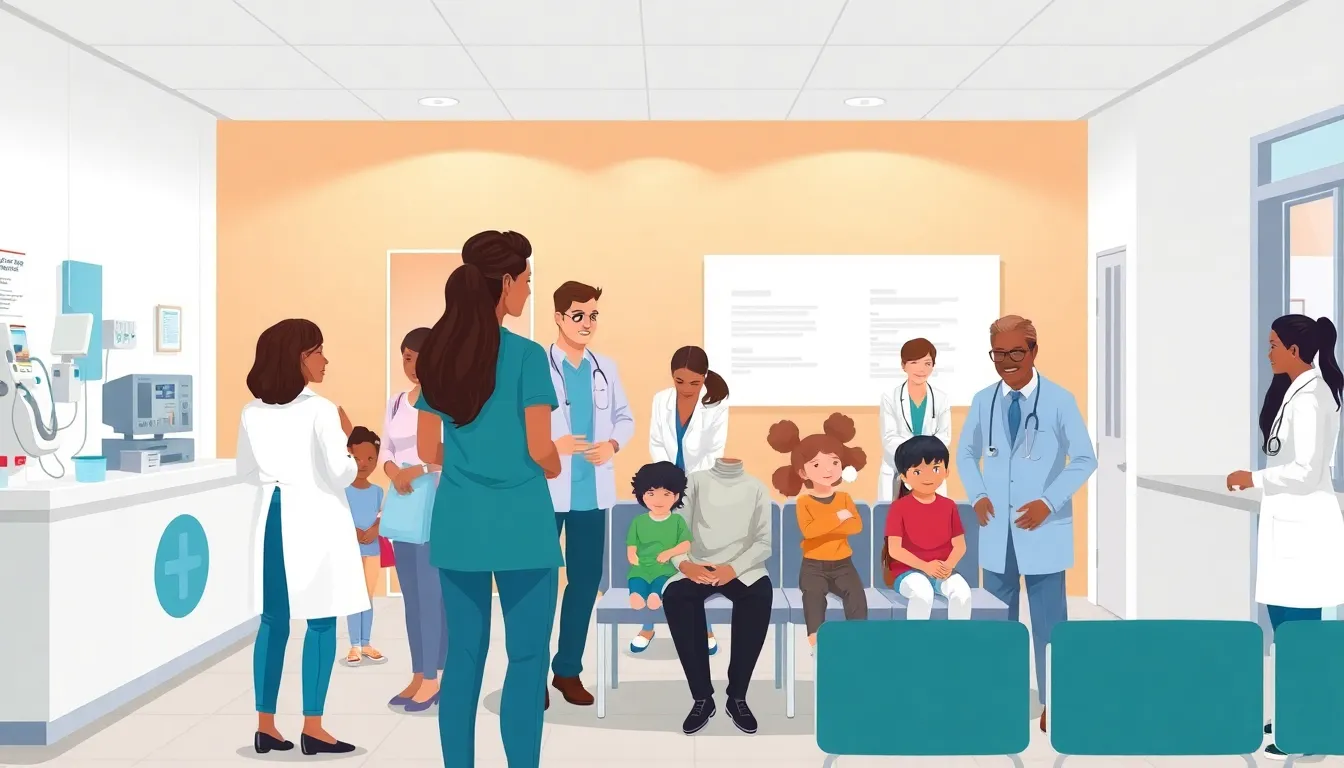When life throws a curveball—like a sudden flu or that unfortunate incident with the lawnmower—an immediate care clinic is the superhero you didn’t know you needed. These clinics swoop in to save the day, offering quick and convenient medical attention without the long wait times of a traditional ER. They’re like the fast food of healthcare, but instead of fries, you get stitches and advice on how to avoid future mishaps.
In a world where every minute counts, immediate care clinics are here to make sure you don’t spend your day in a waiting room binge-watching reruns of your least favorite show. With extended hours and a range of services, they cater to everyone from busy parents to adventurous thrill-seekers. So next time you find yourself in need of urgent care, remember—it’s not just a clinic; it’s your ticket to feeling better, faster.
Table of Contents
ToggleWhat Is An Immediate Care Clinic?
Immediate care clinics serve as healthcare facilities designed to provide urgent medical attention for non-life-threatening conditions. These clinics operate outside typical physician office hours, offering extended accessibility for patients. Individuals seeking prompt care for minor injuries or illnesses often find immediate care clinics to be a fitting choice.
Services available at immediate care clinics typically include diagnosis and treatment for common ailments, such as colds, flu, sprains, and minor wounds. Additionally, clinics frequently offer preventive care, such as vaccinations and health screenings. Many clinics accommodate walk-in patients, which enhances their convenience.
Immediate care clinics play a significant role in reducing the burden on emergency rooms. Long wait times at emergency departments often lead individuals to seek faster alternatives for less severe health concerns. Patients relief from waiting lengthy periods can significantly improve their overall healthcare experience.
Costs at immediate care clinics generally remain lower than those associated with emergency room visits. Insurance plans often cover care provided at these clinics, making them a cost-effective solution. The efficient, streamlined process of immediate care clinics helps ensure that individuals receive the appropriate care they need without excessive delays.
Locations of immediate care clinics are strategically chosen to enhance accessibility. Many clinics are situated in urban areas or near residential communities, facilitating prompt medical attention for those in need. Patients looking for timely and effective care often discover that these clinics are invaluable resources for managing urgent health issues.
Services Offered By Immediate Care Clinics

Immediate care clinics provide a wide range of medical services tailored to urgent and preventive healthcare needs. They serve as accessible alternatives for individuals seeking quick medical assistance.
Urgent Care Services
Immediate care clinics focus on treating non-life-threatening conditions. These facilities manage ailments like sprains, fractures, and infections. Medical professionals also address dermatological issues such as rashes or minor burns. Many clinics conduct diagnostic tests, including X-rays and lab work, ensuring timely care. Patients often appreciate the expedient treatment options available without the need for appointments. Walk-in capabilities make it easier for individuals to seek help when unexpected health concerns arise.
Preventative Care Services
Preventive care plays a vital role in maintaining overall health. Immediate care clinics offer vaccinations that protect against various illnesses, such as flu and tetanus. Regular health screenings can identify potential health risks early on. Clinics also provide guidance on lifestyle changes, including nutrition and exercise recommendations. Patients benefit from timely education about health management. Some facilities offer wellness exams, catering to families and individuals seeking routine check-ups. These services emphasize the importance of proactive health measures in preventing future medical issues.
Benefits Of Choosing An Immediate Care Clinic
Immediate care clinics offer patients a variety of advantages, making them a preferred choice for urgent medical needs. These benefits include shorter wait times and cost-effective care options.
Shorter Wait Times
Immediate care clinics prioritize efficient service, often providing quicker evaluations than traditional emergency rooms. Many patients experience wait times of less than 30 minutes for treatment. Staffing levels are designed to handle high patient volumes without the delays typically seen in emergency settings. With the option to walk in without appointments, individuals access care promptly. Clinics tailor their operations to address immediate health concerns, allowing patients to return to their daily activities sooner.
Cost-Effective Care
Costs at immediate care clinics are generally lower than those found in emergency rooms. Patients pay an average of $100 to $200 for services, compared to $1,000 or more for emergency room visits. Multiple insurance plans cover clinic visits, increasing affordability for patients. Additionally, straightforward billing processes enhance financial transparency for visitors. By reducing out-of-pocket expenses, immediate care clinics present a financially sensible option for families and individuals seeking urgent medical attention.
When To Visit An Immediate Care Clinic
An immediate care clinic suits various non-life-threatening health concerns. Patients experiencing minor injuries like sprains or strains often benefit from prompt attention at these facilities. Individuals with common illnesses, including colds or flu-like symptoms, find these clinics to be convenient alternatives to primary care physicians or emergency rooms.
Fever in children may necessitate a visit to an immediate care clinic for evaluation and treatment. Conditions such as rashes or skin infections are also manageable at these facilities. When experiencing headaches or digestive issues, seeking care at an immediate clinic offers relief without the long wait associated with emergency visits.
Many clinics cater to walk-in patients, making them ideal for unexpected health issues during evenings, weekends, or holidays. If a sudden allergic reaction occurs, immediate care clinics provide essential treatment. Supporting preventive care, clinics deliver essential vaccinations and health screenings, ensuring comprehensive health management.
Patients should utilize these clinics for minor fractures or lacerations requiring stitches—injuries that may not necessitate a full emergency room visit. When experiencing non-critical but urgent health issues, choosing an immediate care clinic offers timely and affordable solutions.
Statistics show average wait times in these clinics remain under 30 minutes, enabling patients to receive care swiftly. Cost comparisons reveal expenses typically range from $100 to $200, a significant contrast to emergency room bills. By prioritizing urgent care needs, immediate care clinics effectively serve communities seeking accessible health services.
Immediate care clinics play a vital role in the healthcare landscape by providing accessible and efficient services for urgent but non-life-threatening health issues. With their extended hours and diverse offerings they make it easier for patients to receive timely care without the stress of long wait times.
These clinics not only alleviate the burden on emergency rooms but also offer a cost-effective alternative for families and individuals. By prioritizing convenience and affordability they stand out as essential resources for anyone facing unexpected medical needs. Embracing immediate care clinics can lead to quicker recoveries and better health management overall.



